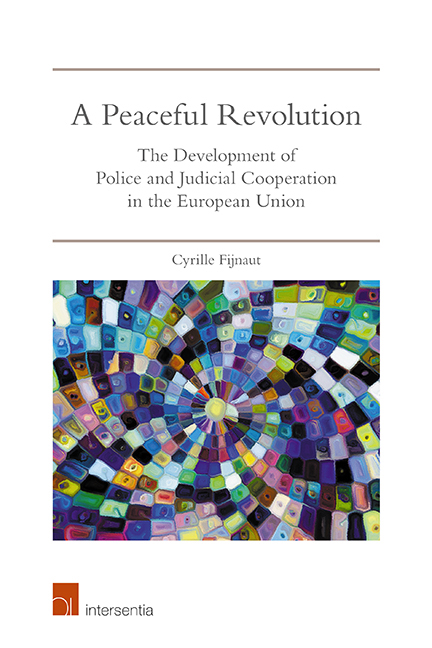Book contents
- Frontmatter
- Preface
- Contents
- List of Acronyms and Abbreviations
- Chapter 1 General Introduction
- PART I THE HISTORICAL BACKGROUND TO POLICE AND JUDICIAL COOPERATION IN THE EUROPEAN UNION
- PART II THE FOUNDATION OF POLICE AND JUDICIAL COOPERATION IN THE EUROPEAN UNION
- PART III THE CURRENT STATE OF POLICE AND JUDICIAL COOPERATION IN THE EUROPEAN UNION
- Chapter 7 The Treaty of Lisbon and the Stockholm Programme
- Chapter 8 The Treaty of Lisbon and the European Agenda on Security
- Chapter 9 General Conclusion
- Bibliography
- About the Author
Chapter 7 - The Treaty of Lisbon and the Stockholm Programme
from PART III - THE CURRENT STATE OF POLICE AND JUDICIAL COOPERATION IN THE EUROPEAN UNION
Published online by Cambridge University Press: 09 November 2019
- Frontmatter
- Preface
- Contents
- List of Acronyms and Abbreviations
- Chapter 1 General Introduction
- PART I THE HISTORICAL BACKGROUND TO POLICE AND JUDICIAL COOPERATION IN THE EUROPEAN UNION
- PART II THE FOUNDATION OF POLICE AND JUDICIAL COOPERATION IN THE EUROPEAN UNION
- PART III THE CURRENT STATE OF POLICE AND JUDICIAL COOPERATION IN THE EUROPEAN UNION
- Chapter 7 The Treaty of Lisbon and the Stockholm Programme
- Chapter 8 The Treaty of Lisbon and the European Agenda on Security
- Chapter 9 General Conclusion
- Bibliography
- About the Author
Summary
INTRODUCTION
This chapter covers developments in the years when the Union's policy on police and judicial cooperation was based on the Treaty of Lisbon and the Stockholm Programme. This programme was intended to guide policy from 2010 until the end of 2014, but this chapter covers the general evolution of the policy formulated in the Stockholm Programme up until 2017 – 2018 for two reasons.
The first is the acceleration in the formulation of policy on police and judicial cooperation that occurred in 2015 – 2016 in response to events such as the migration crisis, a series of jihadist attacks and, to a certain extent, Brexit. For the purposes of the cohesion and depth of the review it is better to discuss the huge impact of these three large and complex issues on policy individually in chapter 8.
The second reason is that by discussing the implementation of important parts of the Stockholm Programme in this chapter until the end of 2018, the reader will have a better idea of the role played by the Stockholm Programme in the development of the Union's police and judicial policy than if the discussion of its evolution were to be interrupted at the end of the Stockholm Programme in December 2014.
The structure of the chapter naturally follows the template outlined in the general introduction. This means that the Copernican revolution in the constitutional arrangements for police and judicial cooperation between the member states of the Union brought about by the Treaty of Lisbon is discussed in section 7.2. That discussion is followed in section 7.3 with a review of the drafting and substance of the policy programme – the Stockholm Programme and the accompanying action plans – which gave practical effect to that revolution.
The renewal of police and judicial cooperation accomplished by the Treaty of Lisbon during this period is the focus of sections 7.4 and 7.5, which are followed by a discussion of the completion of the talks on a regulation for protecting the personal data that could be exchanged in the context of these forms of cooperation in section 7.6.
- Type
- Chapter
- Information
- A Peaceful RevolutionThe Development of Police and Judicial Cooperation in the European Union, pp. 441 - 582Publisher: IntersentiaPrint publication year: 2019
- 1
- Cited by



